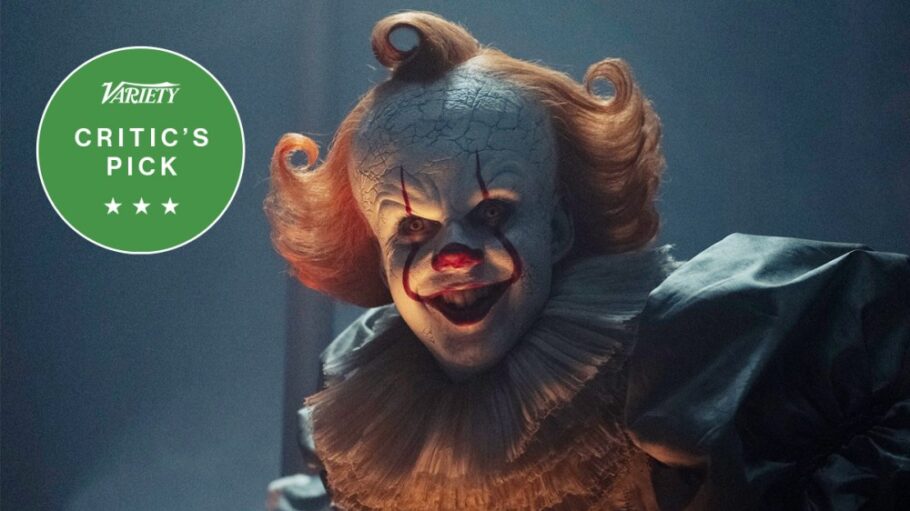Based on the iconic 1986 novel by Stephen King and serving as a prequel to the 2017 and 2019 “It” films, HBO’s “It: Welcome to Derry,” created by Andy Muschietti, Barbara Muschietti and Jason Fuchs, is an intricate psychological horror that blends history, the supernatural, race relations and intense fear. The series is a masterfully woven and terrifying tale about the origins of the monstrous Pennywise the Clown (portrayed by Bill Skarsgård, as in the movies). The show may be set in the past, but its themes have never echoed louder today.
“It: Welcome to Derry” opens on a snowy January day in 1962 in Derry, Maine. Having been run out of the movie theater for entry without payment and refusing to go back to his abusive home, a 12-year-old boy (Miles Ekhardt) sucks fiercely on his emotional support pacifier while trying to hitchhike his way out of town. Before long, an unassuming couple stops to pick him up. Almost immediately, the boy realizes something gravely sinister is amiss. Yet, stricken with terror, he has no recourse to escape the vehicle.
Four months later, U.S. Air Force Major Leroy Hanlon (Jovan Adepo) lands in Derry, where he is slated to be stationed for his latest assignment. He’s eagerly anticipating the arrival of his wife, Charlotte (Taylour Paige), and 12-year-old son, Will (Blake James), so they can move into their new home in town. For now, the flyboy will be resting in the barracks. Unfortunately, some of his comrades don’t receive him warmly. Racism certainly isn’t a foreign experience for Leroy, but what does stick out to him are the oddities of this particular Air Force base. Leroy and his friend Pauly Russo (Rudy Mancuso) immediately notice the numerous restricted areas, which appear to interfere with sacred Indigenous grounds. Additionally, a fellow Black airman, Dick Hallorann (Chris Chalk), has unexplained privileges and unparalled access to the highly ranked General Shaw (James Remar).
Elsewhere at Derry High School, Lilly (Clara Stack) has returned from a stint in Juniper Hill asylum. She’s almost as ostracized as her Black classmate Ronnie (Amanda Christine), whose father Hank (Stephen Rider), the movie theater’s projectionist, is being blamed for the disappearance of the boy from four months earlier. Desperate for some semblance of normalcy and a return to the life she knew before Juniper Hill, Lilly teams up with Ronnie, who is determined to clear her father’s name, as well as their classmates, Phil (Jack Molloy) and Teddy (Mikkal Karim-Fidler), in an attempt to find out what really happened on that snowy January evening. The motley crew, which later includes Will and Rich (Arian S. Cartaya), embark on a journey of otherworldly fear and horrors.
It cannot be overstated how outstanding the younger cast is. The foundation of “It,” from the novel to the films, and now with this series, examines how evil seeps, morphs and changes the lives of children forever. The cast’s emotional depth and depictions of fright and panic really elevate “It: Welcome to Derry.” Stack’s Lilly particularly stands out as a young girl still terrorized by the traumatic loss of her father, but desperate to save her friends from experiencing similar kinds of anguish.
Amid the paranoia of the Cold War, the eight-episode season (critics received five for review) has many eerie elements, including its parallels to the present day. Black and Indigenous Derry residents are barely tolerated, but the horrors of the Jim Crow South, where the National Guard is beating down protesters, play on television screens in the background. Moreover, the show takes the trope of the Magical Negro, bending and twisting it on itself to prove Black people aren’t required to fix the broken systems they didn’t create. The series also illustrates the narrow-mindedness of adults, unable to understand and reconcile the plight of children until they are forced to face the things they have previously refused to see.
Though the theme of childhood innocence remains at the core of “It: Welcome to Derry,” the show expands even further to address the issues that continually haunt the essence of the American experience. Abuse, racism, psychological trauma, infringement on Indigenous land and militarization are all significant elements here. When it’s all said and done, “It: Welcome to Derry” is a worthy prequel series that not only details the emergence of Pennywise, but also turns a lens on society to showcase how truly horrifying we can be as human beings.
Love Film & TV?
Get your daily dose of everything happening in music, film and TV in Australia and abroad.
“It: Welcome to Derry” premieres Oct. 26 on HBO and HBO Max at 9 p.m. ET with new episodes dropping weekly on Sundays.
From Variety US































